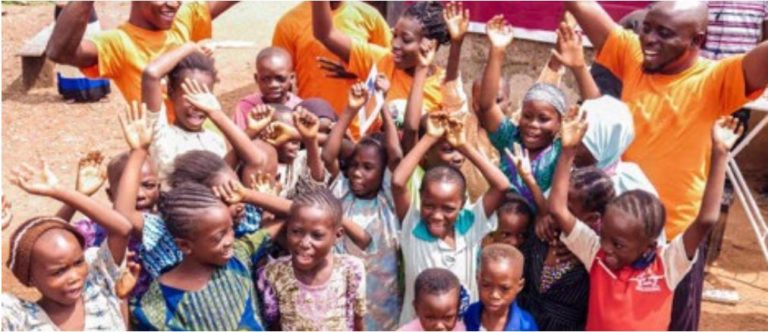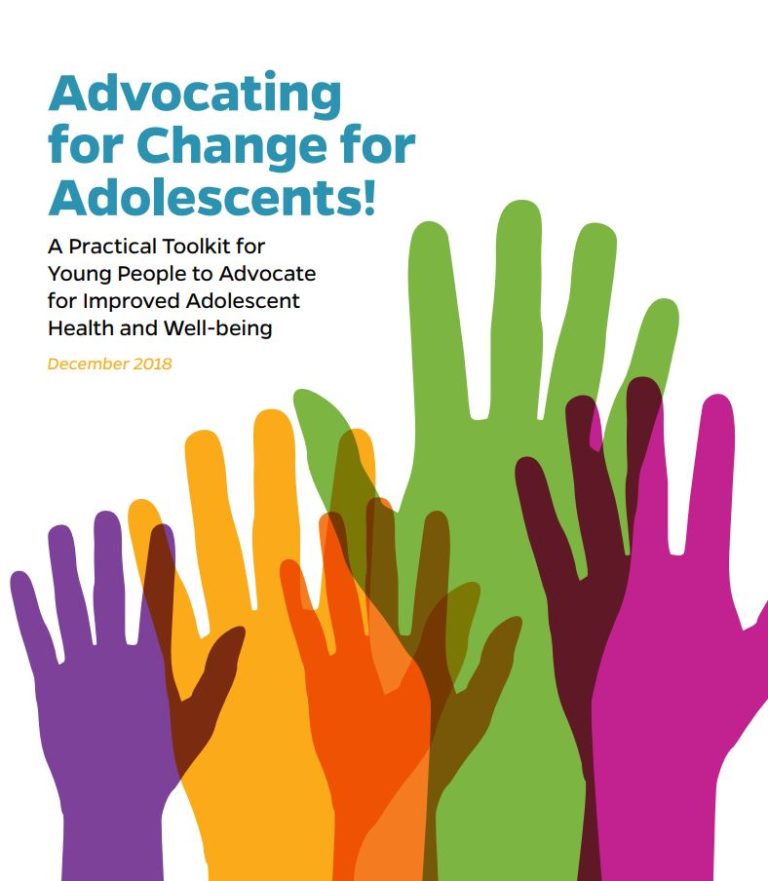A Practical Toolkit for Young People to Advocate for Improved Adolescent Health and Well-being
Today, there are more young people in the world than ever before, and they have the power to bring about unprecedented societal and economic progress. However, they can only transform the world if they survive and thrive and, at present, too many adolescents are not able to reach their full potential due to preventable or treatable causes, complications in pregnancy and childbirth, and AIDS-related deaths. In addition, millions of adolescents find themselves displaced by conflict or disaster and are in need of humanitarian assistance.
The Advocating for Change for Adolescents! Toolkit was created with the hope of inspiring support and encouragement for more youth-led, high-impact solutions for adolescent health and well-being in order to benefit, not only today’s adolescents, but also future generations.
The toolkit is a joint effort between The Partnership for Maternal, Newborn & Child Health (The Partnership) and Women Deliver, with the support of several partners and contributors. Its purpose is to guide the design, implementation and monitoring of an effective national advocacy action roadmap to bring about positive policy-specific changes to improve the health and well-being of adolescents.
It was developed by young people, for young people, to be used by networks of youth-led and youth-serving organizations to change the world.
Case Studies
From 2017 to 2018, five youth-led organizations, with financial and technical support from The Partnership and Women Deliver, have used the toolkit to guide their design, implementation, and monitoring of national advocacy action roadmaps to improve the health and well-being of adolescents through policy-specific changes. Here are summaries of their stories and lessons learned:
Cameroon
The Cameroon Youth Network’s Advocating for Change for Adolescents project was established to increase accountability for adolescent health and well-being in Cameroon by advocating for harmonized and systematic collection of disaggregated data between August 2017 and September 2018. Their objectives included:
- improving advocacy for change for adolescent health and well-being by launching a national advocacy toolkit by August 2018
- improving data collection tools in Cameroon by designing a new and harmonized toolkit for collecting additional and disaggregated data on adolescent health and well-being by September 2018
- improving Cameroon’s commitment to deliver for adolescent health and well-being by advocating for the adoption of the new toolkit to accompany the comprehensive sexuality education programme for secondary schools (proposed by the youth organization Deserve Cameroon) by the start of the academic year 2018/19.
The project was launched on 12 August 2018 at the National Museum in Yaoundé during celebrations marking the 19th International Youth Day. The launch event was achieved thanks to a collaboration with the Ministry of Youth Affairs and Civic Education (MINJEC). Government and United Nations representatives attended, as well as 300 young people affiliated to the Cameroon Youth Network, wearing T-shirts funded through the project. The event was covered by the media.
The Cameroon Youth Network published 100 soft copies of the toolkit in both English and French. The group continues to seek support from government decision-makers to institutionalize comprehensive sexuality education in secondary schools, including utilization of the monitoring and evaluation tools.
India
The YP Foundation’s Advocating for Change for Adolescents project goal was to enable policies and programmes, grounded in young people’s lived realities, to help them realize their sexual and reproductive health and rights (SRHR). Their objectives were to advocate for participation by young people, and to ensure that they inform and participate meaningfully in the design and delivery of youth SRHR programmes and policies by July 2018. These objectives would be achieved through:
- creating platforms where young people could lead discourses with relevant stakeholders, including policy-makers, health officials, service providers and front-line health workers
- developing a cohort of young advocates (at least 15) with the knowledge, skills and vocabulary to advocate effectively for adolescent health and increase engagement with decision-makers
- creating national context-based and interactive adolescent health advocacy resources for young people.
A state-level consultation and engagement event relating to adolescent health was held on 9 March 2018 in Bihar. The event was attended by more than 60 young people and by 60 representatives of government, health providers and civil society organizations.
Youth-led advocacy initiatives were also held: 50 adolescent indigenous girls attended in Pakur, Jharkhand state, and over 100 adolescent boys and girls, including peer educators, in Jamui, Bihar state.
The YP Foundation developed an in-country advocacy toolkit and launched a read-only version in October 2017 at the International Association for Adolescent Health World Congress in India. The launch was organized in collaboration with the Ministry of Health and Family Welfare (MoHFW). Based on feedback from MoHFW, the YP Foundation adapted the toolkit and is in final stages of the process of creating a web-based interactive version.
The YP Foundation developed a cadre of youth advocates for adolescent health, and created platforms for young people to engage with relevant stakeholders and to lead discourses on adolescent health and well-being.
As an outcome of their successful event, “Youth Insight”, which brought together over 170 young people across 17 Indian states, the YP Foundation plans to provide technical assistance and act as convener for at least a year, to ensure that youth-led advocacy on adolescent health continues at district, state and national levels.
Kenya
The goal of the Organization of African Youth’s (OAY) Advocating for Change for Adolescents project was to work meaningfully with the government, service providers and other key stakeholders to advocate for and improve the implementation of the Adolescent Sexual and Reproductive Health Policy (ASRH) in order to increase access by adolescents in Kenya to SRHR information and services. Their objectives were:
- to work collaboratively with the government to develop youth-friendly, evidence-based information, education and communication materials to increase the availability of SRHR Information and services, in order to reduce pregnancy and HIV infections among adolescents in Kenya by October 2018
- to build the capacity of at least 20 youth-led and youth-serving organizations in their communities to advocate for increased access to adolescent health and well-being services and information in Kenya by 2018
- to increase dialogue by October 2018 between adolescents and government teams concerning the adoption of new practices on adolescent SRHR in Kenya.
OAY worked with the Ministry of Health (MoH) to adapt and disseminate the toolkit. They formed a working group composed of seven youth-led organizations that worked with OAY to adapt the toolkit to the Nigerian context. They rallied stakeholders and organized a successful launch of the final product in March 2018. In partnership with Jiactivate, they also disseminated the toolkit during a Jiactivate event which brought together 100 young people in 15 counties. OAY disseminated the toolkit as a resource to help advocates plan, implement and monitor their work in the counties.
OAY secured support from and partnership with the national government through the MoH and the National Youth Council. They built capacity in 47 youth-led organizations on the use of the toolkit in three counties. They also persuaded an elected Member of a County Assembly, Bungoma County’s First Lady, the National Youth Council’s CEO and the MoH’s Manager of Adolescents’ Sexual and Reproductive Health to act as champions for the toolkit, which was also shared with the Council of Governors’ Health Team.
Through OAY’s working group and its capacity building efforts, sustained ownership, acceptability and usage of the toolkit can be ensured. OAY’s goal is to reach at least four additional counties by the end of 2018.
Malawi
The broad goal of Youth Act Alliance’s Advocating for Change for Adolescents project was to strengthen and improve adolescent health and well-being by advocating for the implementation of the National Youth Friendly Health Services Strategy, in line with national, international and regional frameworks, by 2018. Their objectives included:
- advocating for a 5% increase in access to youth-friendly sexual and reproductive services in 2018 by implementing and monitoring the National Youth Friendly Health Services Strategy
- lobbying to lower the age of consent for adolescents to access sexual and reproductive health services from 16 years to 13 years, in line with HIV testing in Malawi, by 2018.
Youth Act Alliance conducted three consultations between regional youth champions, adolescents and young people, policy-makers and duty-bearers, including District Youth Officers and District Youth-friendly Coordinators.
Additionally, Youth Act Alliance produced two videos in 2017: a music video promotional movie and a short movie on Advocating for Adolescent Change in Malawi. The videos premiered at the Malawi Partner Consultation on Adolescent Health and Well-being, hosted by PMNCH and the Government of Malawi in December 2017, and attended by 80 participants from various constituencies. The videos were later shared through internet-based platforms.
Nigeria
The broad goal of Youth Act Alliance’s Advocating for Change for Adolescents project was to strengthen and improve Education as a Vaccine’s Advocating for Change for Adolescents project goal was to improve the policy environment for upholding adolescents’ and young people’s rights to information and services concerning sexual and reproductive health in Nigeria. To achieve this goal, the project had three objectives:
- improving access to the Family Life and HIV curriculum (FLHE) for adolescents in Nigeria, whether in or out of school, by the end of 2018
- ensuring young people have the advocacy skills necessary to hold policy-makers accountable at state and local levels, by 2018
- ensuring that policy-makers at national and state levels are speaking for, making commitments to and implementing policies that uphold the SRHR of adolescents and young people by the end of 2018.
Education as a Vaccine developed a factsheet by adapting the global toolkit. They also developed a step-by-step guide to help young people undertake advocacy using the toolkit. Key ministries reviewed the toolkit and endorsed its content. The advocacy toolkit was launched on World Population Day, 11 July 2018, by the Chairman of the National Population Commission. The event attracted much press and print coverage and was reported on live TV.
Before their official launch, Education as a Vaccine ran training sessions in seven states, using their pre-existing advocacy structures for young people. These young people reached out to others across their state and trained them to use the toolkit. This multiplied the ripple effect of the training and enabled young people in suburban settings to hold policymakers accountable at state level. A total of 312 young people were reached with the toolkit in those seven states.
Youth advocates across the country met government officials, traditional leaders and other key stakeholders to discuss how to improve the FLHE curriculum in schools, and other SRHR issues. For example, in Calabar trained youth advocates paid an advocacy visit to the Commissioner of Education to discuss how to improve the FLHE curriculum in schools. The Commissioner applauded the youth advocates and pledged his support for their efforts in holding the government to account. He promised to make efforts to train teachers, counsellors and social workers to provide sexual information to young people in and out of school at all levels.
A major accomplishment was forcing a review of the National Policy on Adolescent Health and Development. This was due to their intervention during the United Nations General Assembly in 2017, where they advocated to the Director of Family Health at the Federal Ministry of Health.
Some of the young people trained to use the toolkit also participated in and contributed their views to the focus group discussion hosted by the Federal Ministry of Health.
Through the implementation of this project, Education as a Vaccine has earned recognition from the government and has become involved in other youth networks. Leveraging these spaces, they will continue pushing for their advocacy asks in the future.
Accessing the Resource
The toolkit provides a wealth of information, exercises, and resources designed to assist youth in their advocacy for adolescent health and well-being. For more information, view the toolkit in full.
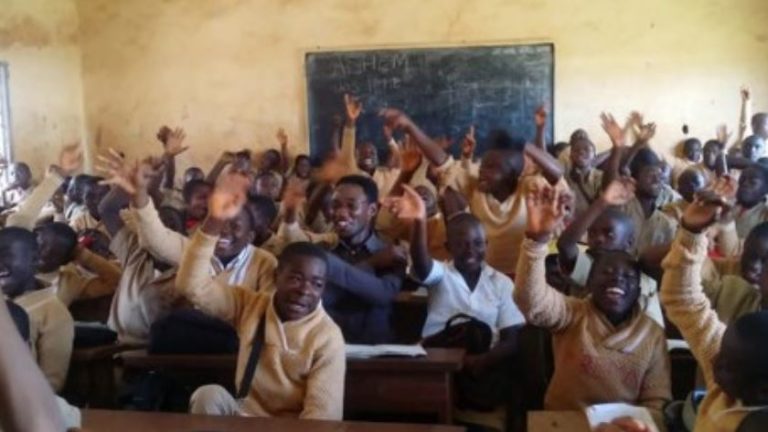
School-based consultation with Grantee Desmond Atanga of Advocating for Change for Adolescents, Cameroon Toolkit
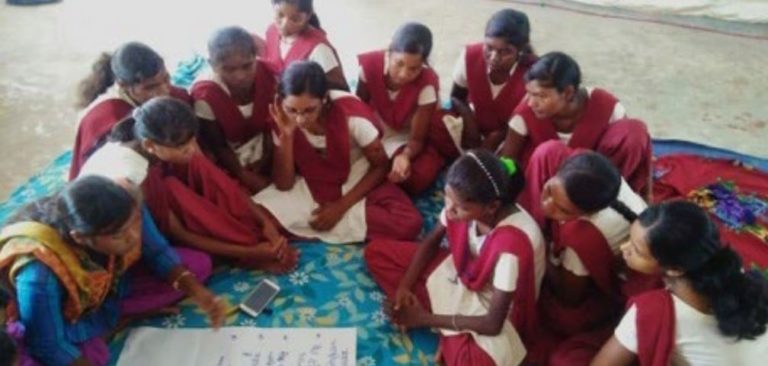
YP Foundation’s Consultation Workshop on Menstrual Hygiene, in Pakur, Jharkhand
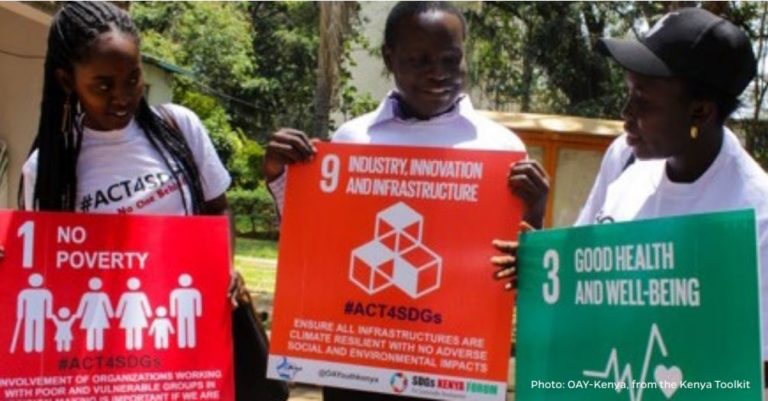
Organization of African Youth representatives promoting the Sustainable Development Goals in Nairobi, Kenya.

Adolescent and youth consultation organized with Ministry of Health and partners, Lilongwe, Malawi, July 2017
